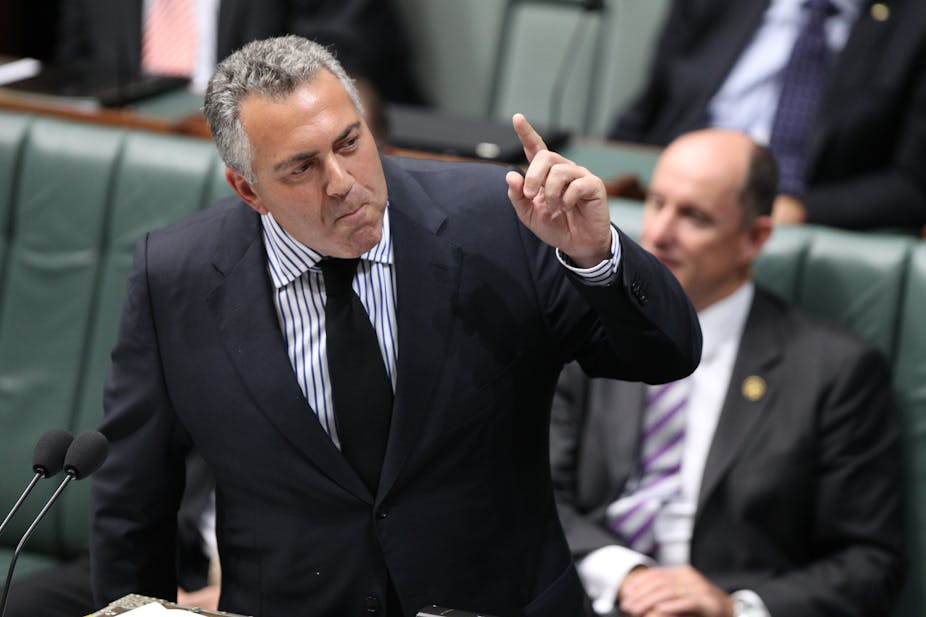The budget update released today will reveal that without policy changes, Australia’s cumulative deficits would total more than $120 billion over the forward estimates.
On the basis of revised numbers, Treasurer Joe Hockey will also say Labor’s real spending growth in the five years to 2012-13 averaged some 3.5% annually, rather than the 2% annual real increase Labor promised.
On Labor’s settings the country would stay in deficit for a decade, according to the Mid Year Economic and Fiscal Outlook, but the Abbott government plans to bring the budget back into surplus sooner through an extensive overhaul of spending and other changes.
The government claims today’s figures are the first “honest” look at Labor’s budget, after corrections in some of the methodology that the former government used.
The deficit for this financial year is forecast to be close to $50 billion. In the pre-election update the deficit forecast was $30 billion.
The number has been worsened by a deterioration in budget revenue, the new government’s $8.8 billion payment to the Reserve Bank, other discretionary decisions, including retaining some infrastructure spending that was to be scrapped, and costs such as having to pay the school kids bonus because the repeal legislation has been blocked.
The figures will show that without countervailing action, debt, which is now around $300 billion, would be more than $500 billion sometime beyond the forward estimates period.
The government is piling as much of the bad news as possible into this update and putting all the blame onto Labor.
Prime Minister Tony Abbott said the MYEFO figures “will be Labor’s last budget statement and it will be Labor’s only truthful budget statement, because what is in MYEFO … will be the result of the decisions which the Labor party had taken - and what Labor has given us is debt and deficit unparallelled in Australia’s history”.
From today the government was ruling a line under this most profligate period although “I’m not saying that the damage won’t be felt for years”.
“In the weeks and months and years to come we’ll be repairing the mess that we’ve inherited from Labor, we’ll be building a strong and prosperous economy. … The repair job starts tomorrow.” The May budget would put the situation “back on a path to a sustainable surplus”.
The Coalition’s fundamental position was that “government, like families and businesses, has to live within its means.
"We have been living – thanks to the former Labor government – wildly beyond our means for far too long and if we are going to get taxes down, if we are going to restore growth and prosperity to our country, we’ve got to get spending under control.”
Although the government won’t be putting an extensive program of cuts into its MYEFO announcement, it will announce savings to offset its backflip on Gonski, when it restored promised funding that it had tried to strip away. These include stopping future projects under Labor’s trades training centres program.
Labor fought back against the government’s blame game.
Shadow treasurer Chris Bowen said the Charter of Budget Honesty, which saw official figures released before the election, meant “treasurers can’t come in now like the old days and say ‘oh look it’s all much worse than I thought’ … The state of the Budget that Labor left … was in the pre-election forecast.”
Opposition leader Bill Shorten said: “This is a government who said there would be no excuses, but now it’s everyone else’s fault.”
Cabinet yesterday considered a package to help Victoria and South Australia in the wake of last week’s announcement that Holden will stop manufacturing in Australia in 2017. The two states – where there are election next year – say the package needs to be big.
Treasury secretary Martin Parkinson, in a speech at the weekend to officials of G20 countries, noted the Holden announcement, which has been surrounded by intense debate about whether more assistance should have been offered to the company.
“None of you would be strangers to the calls for government support that come during difficult economic transitions and it is important that we, as policy makers, maintain focus on our longer-term economic objectives while managing these transitions. One thing we have learnt throughout our history is that structural adjustment can either be managed, or opposed – but it cannot be avoided,” Parkinson said.

